Beigbeder, three years are not the term! Love for the travel agency may last longer
The attention focus of a travel purchase expert is usually shifted towards formal procedures. And here you can see two extremes: either this task is managed by people who do not have a clear idea of their goals and functions in the company, use standard criteria of TMC choice and assessment. Or they do understand all this, but define the criteria as strict requirements, this depriving themselves of an opportunity to hear a new expert point of view. This is the opinion of Mila Lisitchkina, a marketing expert in Starliner and a speaker of ABT-ACTE Russia educational session “The customer and the TMC. The importance of finding each other”. The event was held in Swissôtel Krasnye Holmy on June 27th. Apart from the hotel, session partners were Starliner, AZIMUT Hotel Olympic Moscow, Eventicious and Zelenski Corporate Travel Solutions.
In the expert`s opinion, when it is necessary to solve certain business tasks, the tender is in most cases arranged by the company not in the person of its top managers, but in the person of a purchase department that is guided by the price only. “And even if we start speaking about other important components of travel management, the discussion narrows down to the price, this way or another”, Mila regretted to say.
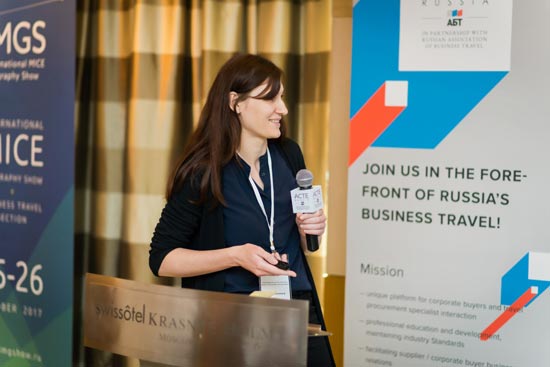
Moreover, many requirements the customer sets nowadays seem to be prejudiced in the present market environment. For example, they include “not less than ten years in the market”. “But it is often the team that matters. Besides, many groundbreaking technologies are developed by young start-ups at present”, the speaker is convinced. Another customer`s requirement that looks rather strange is the number of agency employees – not less than 350 with the annual turnover up to 30 million rubles!
The classical tender procedure does not allow the TMC to show its full worth, Mila summed up. Requirements are set, weight categories are determined, but additional offers are ignored at all. “But a formal approach results in a formal offer”, the expert warned.
Sergey Polyakov, head of centralized purchase department of PAO Cherkizovo Group spoke about what the company was guided by when they were choosing a travel agency. “Our segments are located in almost all the regions – from Moscow to the Urals”, Sergey started. “And the main difficulty of business travel planning is the fact that these are not large cities, but local administrative centers or even countryside. Another problem is a large number of legal bodies, about 50. In addition, a separate factory in Kaliningrad with its own circumstances and restrictions”.
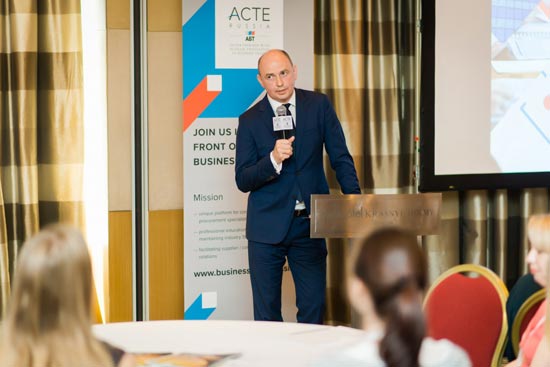
A task was set for purchase specialists – to reduce total travel costs by developing a single and a transparent business trip planning process. An important addition to the requirements in this case was the amount of employees – about 14 thousand.
“Besides, every segment was guided by its own policy, each legal entity of the segment chose its own service providers. Consequently, the purchase function in general was decentralized, statistics was absent, there were no single rates. It was obvious that travel cost management was out of the question in this situation”, the speaker stated.
As the result, a single travel policy for all the companies of the group was introduced. A buyer acting on the part of the company was chosen – a purchase and logistics authority. Besides, a tender for TMC services was held.
“And if we used to ask for the price of a certain service, now we asked to make us an offer to optimize our total travel budget”, Sergey explained. Four companies took part in the tender. Some suggested our employees should start using trains, others suggested we should start using online booking right away. And only one provider agreed to an additional condition of Cherkizovo Group - a direct agreement with one regional hotel.
“It is our business. The hotel we are speaking about was the author of this offer itself. Evidently, against the background of many chain hotels opening. They offered us a better rate. And it was really the best. All the tender participants had an opportunity to try getting the same rate as we did, but the hotel took the principled stance”.
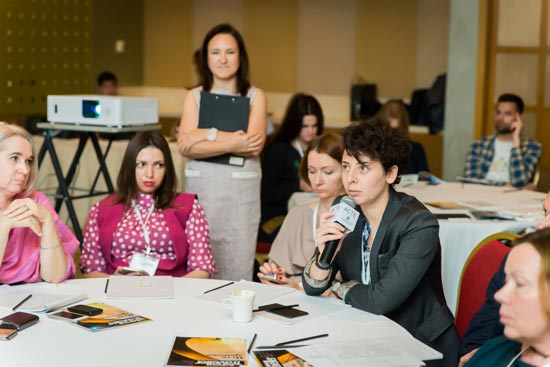
Sergey added that it was important for the company to transfer the full purchase volume to the agency, and not to split it into separate segments: “This is what we hope to achieve our cost optimization with, and to develop a control system as well. We are willing to try online booking, but we understand that it is too early to introduce it yet”.
Angelika Starostina, head of partner department of HRG raised the topic of maintaining the chemistry of relations between the customer and the travel agency. Which is hard, the agency will have to reach the “God” level!
“You sometimes find yourself in a situation when the customer thinks: “Good, the agreement has been signed! And now I will see how you manage to implement it”. But a large amount of work is done together, Angelika stressed. There should be partner relations, with mutual respect, a desire to listen to and to hear each other, readiness for a meaningful dialogue. Like in a family – it is very difficult to build up relations when one person dominates and the other obeys”.
The expert paid special attention to the work of the employees who deal with customer requests, in the first turn. If there is order in the work of the front office, there is order in all the aspects of customer relations, be it classical service or online booking: “It is the service quality here, the expertise of our consultants that stipulate the traveller`s satisfaction level”.
Is the customer always right? “Probably not, situations may be different”, is the speaker`s opinion. “It`s a different matter how the agency solves this or that questionable situation”.
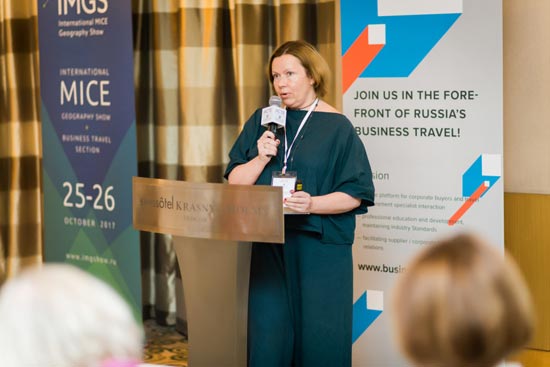
There was one of similar situations, when a traveller found an airline ticket at a lower fare on the air carrier`s website. “It is a frequent situation”, the expert noted. “Nowadays airlines are interested in increasing the amount of direct sales, so they offer cheap tickets on their websites”.
It is a classical story – agents could not offer the price that was on the air carrier`s website. But everyone should understand: in order to issue a ticket like that, you need to have a credit card and to meet a number of requirements. And if the traveller is ready to accept them after all, the agent loses control of this booking. Which means that he will not be able to make changes into the order, if such changes do appear. And what is the result? The customer is disappointed: “How is that? I give you so much business, and you can`t give me this fare”.
“We showed understanding for the customer`s situation and contacted the airline on the website of which the fare was found. And we agreed with the airline to transfer it from their website into our booking system. The unpleasant situation was eventually settled”, Angelika said.
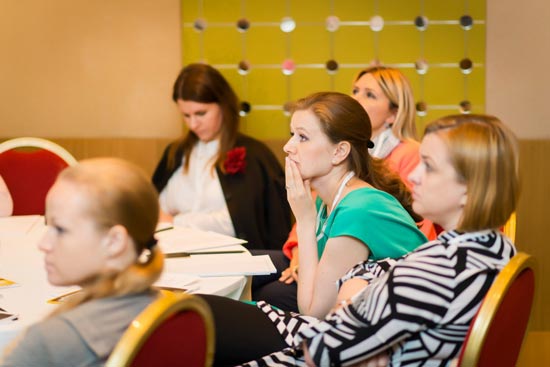
In another situation, in order to wear off an impression and to do a favour for a partner who had suffered some inconvenience due to the agent`s fault when he booked a trip to Georgia, the company offered him to upgrade his airline ticket to business class. But the customer`s reaction was unexpected: “Great, okay, do please, and not now, but in a month when I fly to New York”. The agency had to refuse this insistent demand. “We have to take into account our business interests as well”, the expert explained.
It often happens that a customer asks for something impossible: during the World Economic Forum in Saint Petersburg a customer contacted the agency on the starting day of the conference and asked to book a room for him in a certain hotel of the Northern capital. It was a challenging situation, but after talks with various providers, HRG managed to do it. But … not at the price the customer had accounted for. “He was very displeased with this fact”, Angelika said. “However, it should be understood that having a direct rate does not usually help you in such peak dates. Event dates like this are usually blackout dates”.
Another situation that happened to the agency may be called unusual. “Once our customer called us and said that their highly positioned representative was staying at a hotel booked by us and he did not eat fill at breakfast”. HRG representatives contacted the hotel immediately and arranged on the customer having another breakfast free of charge. As the result, the conflict was settled.
Then Aleksandra Perekalskaya, head of administrative department of Leroy Merlin shared her experience of “love” to the agency. “What does this love start from? From the first date, the agency prepares for thoroughly. As for large global customers, such dates are often limited to speed dating, for small and inexperienced ones they are casual relationship, medium size companies have a long rose and candy stage. The next stage is marriage, a contract, correspondingly, then relations foreseen by this contract follow. Then goes a scandal or a sweetheart break-up”. And then goes the next love – on a competitive basis.
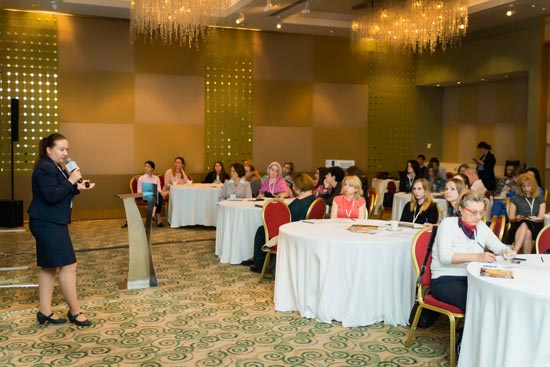
“The agency we are working with nowadays cannot be called our first love, moreover, our global policy recommends us holding a tender for a service provider every three years”, Aleksandra noted.
The start of cooperation with the last TMC was accompanied by the introduction of an online booking system by Leroy Merlin. In the first year the company studied new procedures, trained staff, adopted the new philosophy, the “online psychology”. “We adapted to each other”, Aleksandra recalls. “Besides, we were growing rapidly. In general, for the past three years 34 new supermarkets were opened, more than 10 thousand employees hired, 17 cities were discovered and more than 25 thousand business trips were made every year”.
After three years` work with the agency they had chosen, Leroy Merlin realized they did not want to change their partner: “We have not loved each other enough”. The plans for the next three years include discovering another 20 Russian cities together, but not cities with a millon-plus population, which means they are not so convenient from the point of view of logistics. And to come to the near-abroad countries – Kazakhstan, Belorussia.
“The main thing for us is our business growth strategy”, Aleksandra summed up. “Perhaps, one day we will just spend budgets, plan properly, focus on cost saving and hold tenders every year or two, choose providers, compare in millimeters, but at the moment all the effort of the company is devoted to the fulfillment of its strategy. And we are more confident in our current provider, rather than in opportunities, promises, some prospective projects. Not because they are worse, but because we do not want to risk that much at the moment. This is why we are ready to love our travel agency not three, not six years, but as long as we understand it is time “to divorce”.
Kirill Faminsky from Unifest presented his expert point of view on measuring the efficiency of the agency`s work. He noted that when he met customers, he often heard that they needed travel policy control, observance of SLA when working with requests and a scheme of cooperation with VIP customers. They were also interested in decreasing the service fee. “These requests result from two basic needs. The first is customer satisfaction, and the second – corporate buyer`s economy”. So, if you have two variables, you can derive one simple KPI of the agency`s success – the maximum balance between convenience and economy.
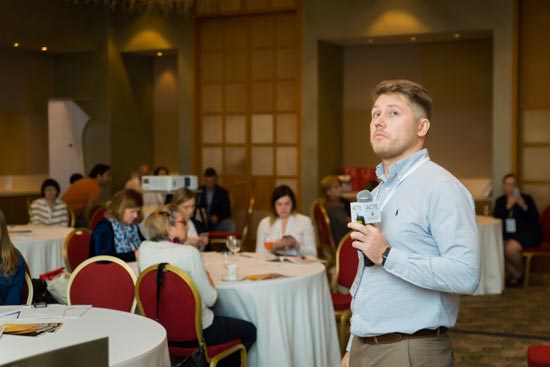
“We have been working on cost saving for years. And at the moment we have probably achieved the threshold of an adequate cut in the customer`s costs. The further tightening of the screws yields almost no result, and on the contrary, it leads to an increase in the traveller`s dissatisfaction and an actual sabotage of the travel policy”, Kirill says. “It means that the result is a decrease in business efficiency”.
The expert paid attention of the audience to the fact that one seldom cares about the traveller`s satisfaction, if ever. The ways to measure it are next to none, the travel policy is modelled and adjusted according to the coordinator`s intuition, as a rule.
What is necessary to achieve the balance between the comfort of business travellers and the company`s striving to cut costs? To choose the right partner. Progressive market players have already introduced ways to control SLA and customer satisfaction automatically, to provide reports.
The key “ingredient” of the balance is top management`s involvement into the process: “A travel coordinator may develop the strategy in cooperation with the agency, in order to present it to the director later. Or the agency does it on its own, but with less submergence into the process in this case. Or this task is set for the participants by means of tenders – that is, on the stage of a provider selection tender”.
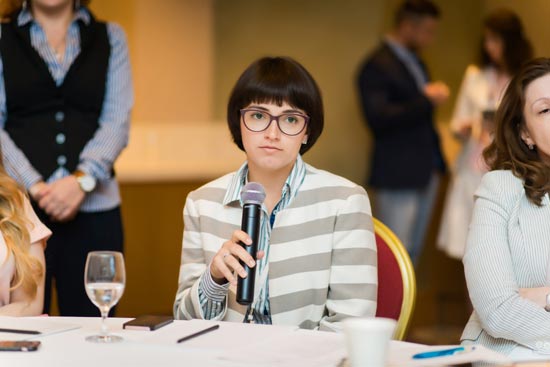
Kirill added that Unifest was so much sure of this model of measuring KPI of a travel agency, that they would like to offer another way of pricing in the market – it allows to attain the balance between the customer`s interests and those of the TMC: “The fee of the agency should be a certain percentage of saving achieved by the customer”.
In order to understand to what extent the interests of the agencies and those of corporate buyers coincide, the organizers of the educational session announced an interactive game… “Love at first sight”. The girls without a couple – Maria Kolesnitchenko (Yandex), Daria Serebryakova (Henkel Rus LLC) and Ekaterina Samorukova (Amway) were introduced to their prospective “halves” Philip Lookianenko (HRG), Vadim Zelenski (ZCTS) and Kirill Faminsky (Unifest). After questions concerning the travel policy, corporate payment tools, types of reports, the presenters announced voting, as the result of which three pairs were selected! Two of them will have an opportunity to continue their acquaintance at breakfast in Azimut Hotel Smolenskaya, and the third one – at dinner in the restaurant of Azimut Hotel Olympic.
The meeting ended with the educational section devoted to report reading rules.
Vera Chelenk, head of administrative department of BNP Paribas dwelled on missed saving report. It shows the difference between the best airline fare for a certain destination that was available, and the fare that was eventually chosen by the traveller.
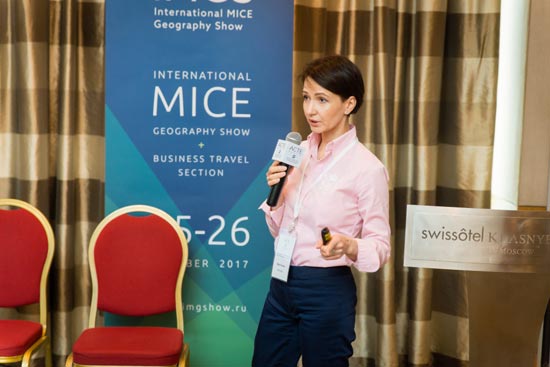
Vera explained that she received these figures from the agency: “We use an online booking system, so our employees book tickets themselves, as a rule. The share of offline bookings is not included into the report. If it is also important for you, tell the TMC about it”.
The expert noted that she used the data not as a financial report, but rather for analysis: “When an employee chooses a ticket that differs from the requirements foreseen by the travel policy, it is important to specify the reason for doing so. This is what reason codes are for”.
Svetlana Abdullina, deputy director of development and infrastructure support department of PAO Binbank drew the example of a “what if” report. It helps in budget planning. And it is much easier to make it if you have an online tool. “Let`s see what will happen if we cut the number of business class flights”, Svetlana assumed. “And our system lets us change the percentage rate of such ticket bookings. Suppose, we cut their number by 50% - the economy will amount to 29 million rubles. If by 100% - 58 million rubles”.
Or you can see what will happen if our employees get from Moscow to Nizhny Novgorod or Saint Petersburg by rapid trains. “In case of our company, ten flights give an overall economy of 110 thousand rubles”, the expert calculated.
Elena Lutsenko, purchase manager of Saint-Gobain explained the essence of benchmark analysis, when you compare your indices, processes, methods, systems with similar ones of another company. “If you have this information, you can make managerial decisions, change approaches, achieve the leader`s result”, Elena is convinced.
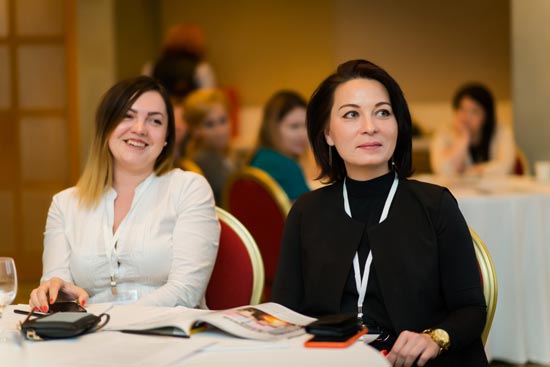
Benchmarking can include a wide range of indices. And this process is endless: you always have what to improve. It had been widely used in business trip planning already, the expert continued. In this case the TMC may play the role of an advisor, suggest what could be better for us.
“On the whole, such “peeking” facilitates internal changes. And even now as we listen to each other, we are engaged in benchmarking, in fact, because we listen to what is going on in other companies”, Elena noted.
Reports compiled with the help of an online system also help Aleksandra Perekalskaya to make conclusions on business travellers` behaviour. “When we worked offline, we could make a rough estimate by analyzing information post-factum and far not every day, but rather every quarter or even every half a year, whether our limits are observed. And now we can take every transaction to pieces to find out why they have probably not been observed”, Aleksandra explained.
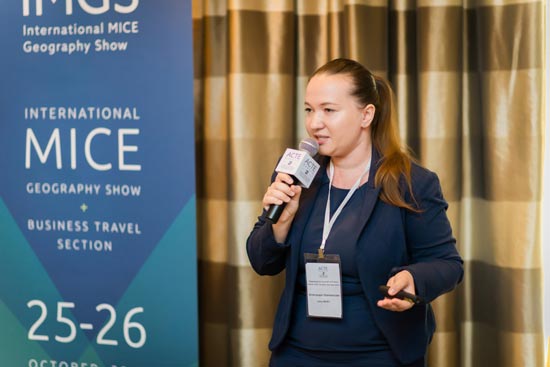
Information upload from an online booking system has helped Leroy Merlin change their internal procedures. Now trans-regional meetings are held by the company not earlier than 10 am, and sometimes even 11, and they are over not later than at 17, so that employees are not late for their flights.
After this the educational session “The customer and the TMC. The importance of finding each other” was over. Before saying good-bye, Irina Mikhalkova, key account director of ABT-ACTE Russia invited the guests to the traditional conference of the Association in Saint Petersburg on August 25 and to the first one in Rostov-on-Don on September 28. “And of course, we are looking forward to seeing you at the International MICЕ Geography Show that will be held on October 25-26, where a lot of nice surprises will be waiting for you!”, Irina said.
Marina Osipova
Sourse: http://buyingbusinesstravel.com.ru